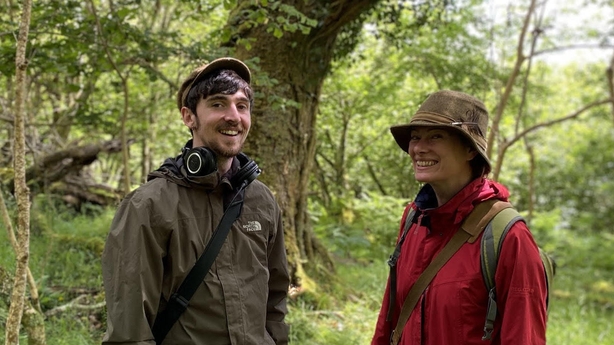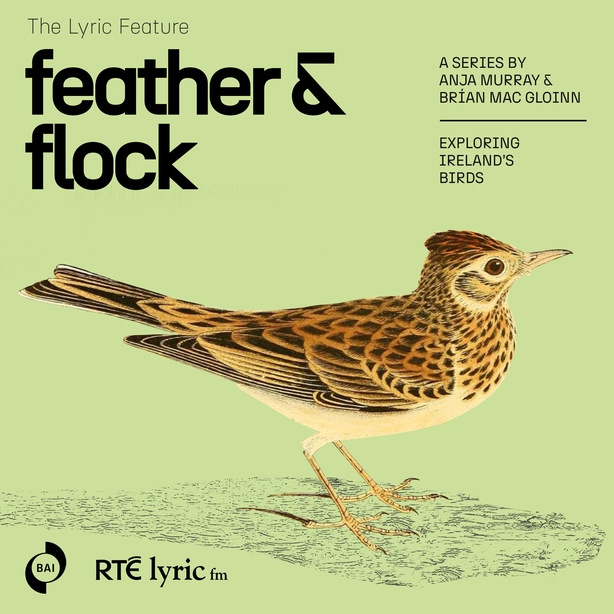Poet Martin Dyar reflects on the experience of contributing to the Lyric Feature's IMRO Award-winning Feather and Flock series, in which poetry, ecology and music work hand in hand.
A few years ago, one hot August day, I sat alone in the Phoenix Park for almost an hour watching a skylark in song-flight.
It had been more than a decade since I’d seen one, and much of the pleasure of the experience lay in recalling a boyhood version of the world. The performance can go as high as a hundred metres. At that kind of elevation, a small shift in the bird’s altitude (a few metres up or down) can cause the dome of the sky to tilt, an illusion all the more thrilling because the indomitable lark, though sometimes yielding to the wind, seems always in control.
Song-flight is intensely beautiful, but it also has a look of fierceness and even risk about it. Control and courage are its modes. To be itself, the skylark appears to need to go to its limits.
The skylark’s sweet and complicated singing, well described by the field guide writer who called it 'uninterrupted’, is equally compelling. What to focus on as an earthbound audience, the uncanny rise and fall or the incredible music?
To my delight, I was recently invited by Anja Murray and Brían Mac Gloinn to contribute a poet’s perspective on skylarks to an episode of their superb Lyric Feature radio documentary series, Feather and Flock.
Brían and Anja are masters of natural sound. In their careful hands the earth rides the airwaves and the audible is the visible. They have also made a new radio artform out of using original music as an ecological tool, a means to tease out connections between varied subjects and lifeforms, and a means to engage the listener's heart in scientific stories. Their work communicates, inevitably, the truth of habitat loss and biodiversity decline, and they are influential activists in their own right. But wonder is their stock in trade.

For the poems and reflections they hoped I might offer, they preferred to book a field and not a studio. Early on a weekend morning, we found ourselves standing where a thin lane met a sloping organic meadow and a fine hedgerow concealed a sea view, and looking into Shelley’s deliberately mad idea that the skylark is not a bird at all. And into Emily Dickinson’s effort in the poem ‘Split the Lark’ to anatomise the lark’s musical ability; Dickinson pictures the source of the song as the innards of a living machine (‘Bulb after bulb, in silver rolled’), the inspection of which she claims would reveal that the sound we love is only a fragment of its innate quality and scope.
In ‘The Skylark’ the labourer poet John Clare sees the lark as inseparable from the hare (‘like some brown clod the harrows failed to break’). Clare’s summer fields are incomplete without that pairing, and he cautions his reader against the idealism that stems from the spectacle of the lark in flight, by insisting that the lark’s awareness of its nest on the ground is a special mark of its character. Wordsworth in ‘To the Skylark’ pursued a similar impression, framing the lark in a terrestrial heaven: ‘type of the wise who soar, but never roam’.
Seamus Heaney’s clean phrasing, ‘like a small black lark’, in ‘A Kite for Michael and Christopher’, brought home what rural observations and rural knowledge represent. It also reminded us of the environmental chaos that might rob that simile of its simplicity.
Brían and Anja are masters of natural sound.
Good poems, the American poet Wallace Stevens once said, are inexhaustible to meditation. The words we explored that morning filled us with conversation, gave us responses on tap, and made us, between the meadow and the microphone, evangelists of a common ground.
Through poetry’s way of understanding and inscribing wonder in response to wildlife, the documentary makers were somehow able to recognise the bird they were after, the bird that other contributors had spoken of in other ways. For my own part, more than once, I raised a hand to the empty sky, where an image was waiting, no less real for being a thing of memory.

The Lyric Feature: Feather and Flock returns with Skylarks on Sunday 27th of October at 6 pm on RTÉ lyric fm - listen to more from The Lyric Feature here. Martin Dyar’s next collection of poems, The Meek, is forthcoming from Wake Forest University Press. He is the editor of the anthology Vital Signs: Poems of Illness and Healing, published by Poetry Ireland.

